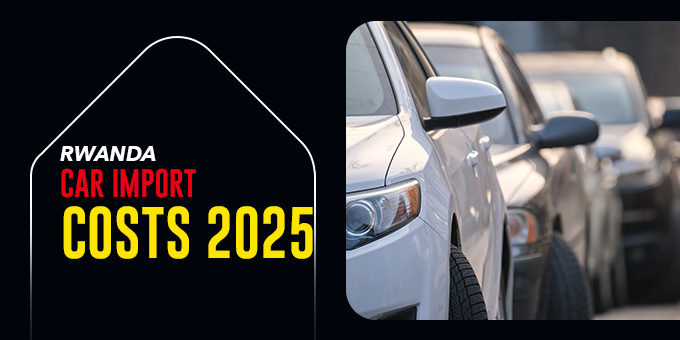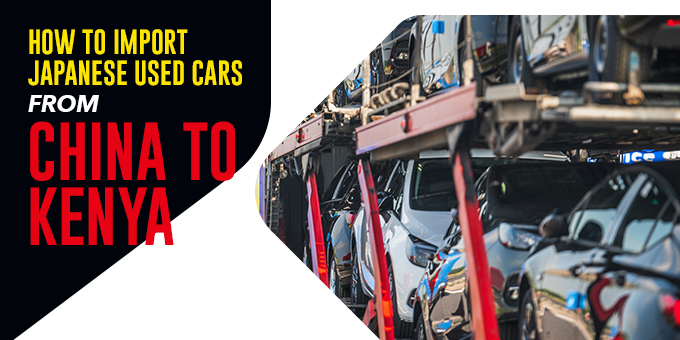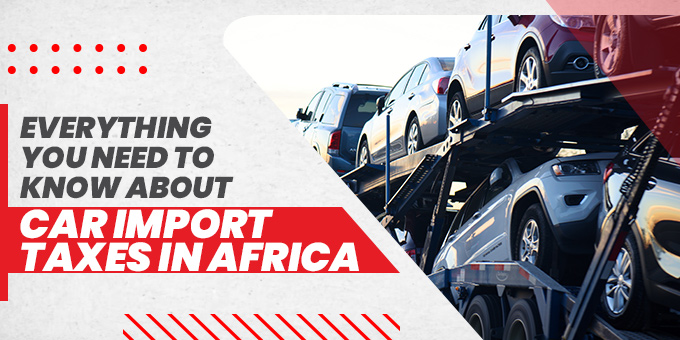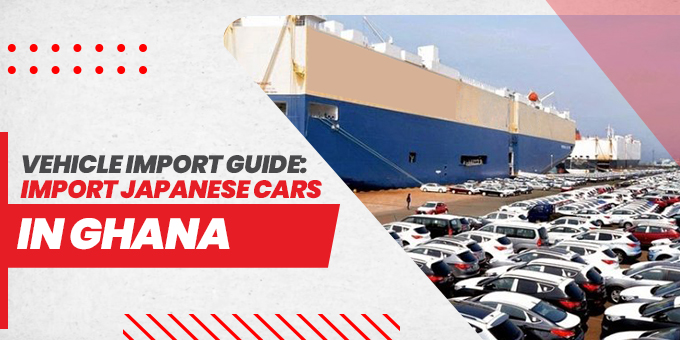For many Rwandans, importing a car, especially a fuel-efficient and tech-packed model like the Toyota Harrier Hybrid 2023, is not just about comfort or status. It’s a smart investment. However, before the keys are in your hands, it's essential to understand what it truly costs to import a vehicle into Rwanda in 2025. Moreover, beyond the purchase price, several additional expenses come into play, including import duties, Value Added Tax (VAT), customs clearance fees, and port charges.
This guide will walk you through every detail of Rwanda car import costs so you can plan your budget effectively. We’ll use the Toyota Harrier Hybrid 2023 as our example to keep things practical and relevant for hybrid car buyers.
Why the Toyota Harrier Hybrid 2023 is Popular in Rwanda
Before diving into the costs, let’s take a quick look at why the Toyota Harrier Hybrid is a favorite among Rwandan buyers.
This SUV combines luxury, efficiency, and innovation. Furthermore, equipped with Toyota's Hybrid Synergy Drive, the Harrier Hybrid offers exceptional fuel economy without sacrificing power. The sleek exterior design, combined with a tech-forward interior, makes it perfect for both city drives and countryside adventures. However, with fuel prices fluctuating, its hybrid technology gives owners long-term savings, an attractive trait for import buyers.
Because it’s categorized as a hybrid, certain duty reductions may apply, which we’ll touch on later in the breakdown.
Key Import Cost Components in Rwanda
Importing a car into Rwanda involves several layers of taxation and administrative costs. Let’s break these down one by one:
1. Import Duty
Import duty is the first and most substantial cost added to the CIF (Cost, Insurance, and Freight) value of the vehicle.
- Rate: 25% of the CIF value
- How it's calculated: CIF value includes the car’s price, shipping charges, and insurance.
For a vehicle like the Toyota Harrier Hybrid, which might cost around $24,000 CIF, the import duty would be:
$24,000 x 25% = $6,000
This is your initial charge payable at customs before your vehicle can proceed further.
2. Value Added Tax (VAT)
Next comes VAT, which is charged in addition to the total customs value, including the import duty.
- Rate: 18%
- How it's calculated: VAT is applied to the CIF + Import Duty + other fees (like handling charges).
Let’s say your import duty and other fixed costs bring the total value to $30,000. Then:
$30,000 x 18% = $5,400
However, VAT can quickly raise the total payable amount, so it’s essential not to overlook it.
3. Excise Duty (If Applicable)
Excise duty in Rwanda is applied to vehicles based on engine size and environmental impact.
Hybrid Discount: Fortunately, hybrid vehicles like the Toyota Harrier Hybrid 2023 are eligible for excise duty exemptions or reductions as part of Rwanda’s green initiative.
Regular vehicles: Non-hybrid vehicles may be subject to excise duties ranging from 10% to 50%, depending on their engine capacity.
As a result, choosing a hybrid can significantly reduce your overall import burden.
4. Withholding Tax (WHT)
WHT is another mandatory tax levied during the import process of a car.
- Rate: 5% of the CIF value
- Calculation: $24,000 x 5% = $1,200
Although this tax is relatively lower than import and VAT charges, it still contributes to the overall figure.
5. Rwanda Revenue Authority (RRA) Processing Fees
While not as large as duties and VAT, RRA charges processing and documentation fees.
Estimated Cost: Ranges between $100 and $250, depending on vehicle type and how the documentation is handled.
These charges cover expenses such as registration, license plate issuance, and customs paperwork.
6. Port Charges at Mombasa or Dar es Salaam
Since Rwanda is landlocked, imported cars typically enter via Mombasa (Kenya) or Dar es Salaam (Tanzania). Here’s what you’ll pay at the port:
- Handling Charges: $150–$250
- Container Offloading & Storage: $100–$200 (varies if the vehicle stays longer at the port)
- Port Security & Admin Fees: Around $50–$100
- Total average: $300–$500, depending on your logistics partner and port activity.
7. Inland Transport to Kigali
Once the car is cleared at the port, it must be transported to Kigali.
- Mombasa to Kigali: Approx. $1,000–$1,200
- Dar es Salaam to Kigali: Slightly cheaper at around $800–$1,000
However, some buyers may choose door-to-door delivery to simplify logistics. This may incur additional fees, but it often saves time and stress.
A Quick Summary Table
- Import Duty (25%): $6,000
- VAT (18%): $5,400
- Excise Duty (Hybrid): $0
- Withholding Tax (5%): $1,200
- RRA Fees: $150
- Port Charges: $400
- Inland Transport: $1,000
- Total Estimated Cost: $14,150
Note: All values are approximations and can vary based on CIF price, exchange rate, and port timing.
Tips to Reduce Import Costs
Now that you have the big picture, here are some proven ways to lower your import expenses in 2025:
1. Go Green with Hybrid or Electric Vehicles
One of the easiest ways to reduce import-related taxes is by choosing environmentally friendly vehicles. Rwanda has actively embraced green mobility by offering reduced or zero excise duty for hybrid and fully electric cars.
- Why it helps: The Toyota Harrier Hybrid 2023, for example, is often exempt from excise duty, which can save you hundreds or even thousands of dollars.
- Long-term benefit: In addition to lower import taxes, hybrid cars reduce your fuel expenses, making them a smart choice for daily commuting in Kigali.
2. Work with Reputable Exporters and Clearing Agents
While it might be tempting to go for the cheapest option online, working with experienced and verified exporters ensures transparency in CIF pricing and logistics.
- Avoid hidden charges: Reputable dealers often offer clear breakdowns of all charges so that you won’t face surprise fees at the port.
- Streamline customs: Trusted clearing agents in Rwanda can fast-track your paperwork, reducing costly delays and storage fees at the port.
Moreover, many Japanese exporters have direct ties with African logistics networks and can offer CIF-inclusive deals, making budgeting easier.
3. Clear Your Vehicle as Soon as It Arrives
Time is money, especially when your vehicle is sitting idle at a congested port. Port authorities in Mombasa or Dar es Salaam typically allow a few days of free storage, after which demurrage charges kick in.
- Cost of delay: Even a few days’ delay can result in additional fees of $100–$200.
- Pro tip: Track your shipment and ensure your clearing agent is ready to process documents as soon as the car arrives. Pre-clearance options may also be available.
Is Importing a Toyota Harrier Hybrid 2023 Worth It?
Absolutely, especially when you consider the long-term savings in fuel, lower emissions, and reduced excise duty. Yes, the upfront import costs may seem steep, but when you factor in fuel economy, durability, and Toyota's reliable resale value, it becomes a smart investment.
Moreover, the 2023 Toyota Harrier Hybrid is loaded with features like:
- Toyota Safety Sense Suite (adaptive cruise control, lane keep assist)
- Dual-zone climate control
- Panoramic sunroof
- Intelligent hybrid drive system
In a growing urban environment like Kigali, where fuel costs are a concern and technology adoption is on the rise, a car like this fits right in.
Final Thoughts
In conclusion, importing a car into Rwanda in 2025 involves more than just purchasing the vehicle. With layered charges such as import duty, VAT, WHT, and port fees, costs can add up quickly. However, by understanding the process, you can save money and reduce your environmental impact at the same time.
So, whether you're a first-time importer or a seasoned buyer, keeping tabs on these charges will help you plan better and avoid unpleasant surprises. The key is to do your homework, choose your partners wisely, and act promptly when your vehicle lands at the port.




